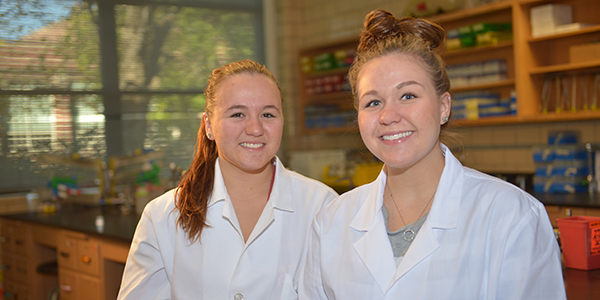
Microbiology: A Family Tradition
Story and image by Barb McBreen
When sisters Ashley and Kenzie Davis get together they talk about science at the micro level.
It’s a passion they share with their father, Robert Davis (’83 microbiology), who has a dental practice in Huxley, Iowa.
“Since I was four years old I’ve wanted to be a dentist because I wanted to be like my dad,” says Kenzie, a sophomore in microbiology. “It’s neat to see how he uses microbiology as a dentist.”
While Kenzie plans to follow in her dad’s footsteps, Ashley, a May microbiology graduate, plans to attend the University of Colorado Skaggs School of Pharmacy and eventually specialize in oncology.
“Oncology pharmacy involves one-on- one patient care,” Ashley says. “I want to work with patients and their families to ease their concerns and inform them about chemotherapy medications.”
The sisters, who are two years apart, are fascinated by microbes that are invisible to the human eye, but an intricate part of daily life. Ashley’s interested in addressing antibiotic resistance. Kenzie’s focused on helping people understand the importance of vaccinations.
“Microbes are hard to understand because they’re so tiny,” says Ashley. “When you talk about medical studies, most students start with anatomy and physiology, but we start with microbes.”
Both can discuss microbes for hours, which includes everything from mold on cheese to microbial clouds. Nick Peters, a plant pathology and microbiology assistant professor who advises Ashley, says microbiology as a major offers endless career opportunities.
“When you look at the total scope of career paths you can go into, from technician to physician or forensics to water quality, there’s lots of opportunities,” Peters says.
Microbes are present when you get sick, but also are important in the production of foods such as yogurt, cheese and wine.
“Some people think all bacteria is bad, but our bodies are completely made up of bacteria. Bacteria gets a bad rap,” says Ashley.
Ashley and Kenzie have worked with high school students at an annual workshop hosted by the microbiology club.
“Going into a lab for the first time is intimidating. The high school workshop gives students confidence and they can decide if they really want to study microbiology because a lot of it is in the lab,” Ashley says.
The sisters describe the microbiology department as a small community of friends and classmates. Peters agrees.
“There are 30 students who take classes together, so everyone knows each other.” Peters says. “They also get opportunities to work as teaching assistants in the introductory lab classes, so they get a perspective on what it’s like to teach.”



